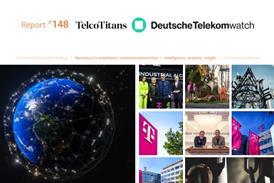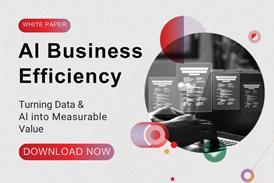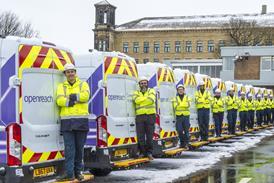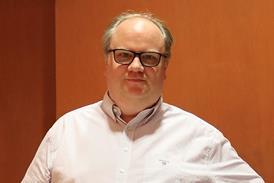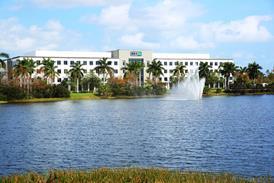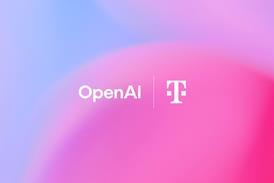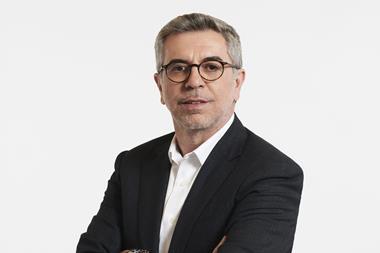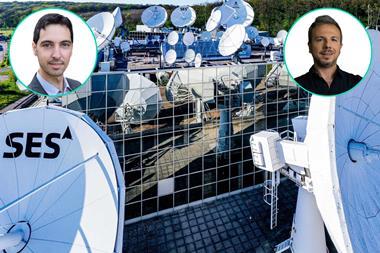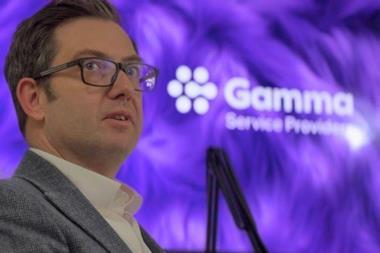- The Telecom and Technology team at global technology enablement leader NCR Atleos believes operators working in margin‑pressured environments can still quickly monetise new technologies in the B2B sphere by working with partners.
- Citing worldwide field and remote services experience as the ‘unsung hero’ of many operator and OEM propositions, NCR Atleos advocates moving fast while meeting ever‑growing calls for telco‑grade reliability and right-first-time.
- Deep relationships with key players across the field of hardware, software and GPU manufacturing enable NCR Atleos to bridge telcos and vendors, supporting operators’ partner and enterprise technology preferences.
- An eye for emerging technology and experience sunsetting legacy tech has led NCR Atleos to develop an “infinity loop”, lifecycling through conception to retirement, spanning generations.

Telcos are building their digital services futures on investment in next‑generation fibre and 5G infrastructure in circumstances very different to the past.
Revenue gains may not be immediate, particularly in Europe, placing the quest for sustainable margins against a backdrop of continued pressure on capital and operational spending, as well as intense competition. This has created a situation where operators have placed their heads in the cloud (or indeed multi-clouds), while still needing to keep feet firmly on the ground.
The Telecom and Technology team at global technology services partner NCR Atleos considers itself a pragmatic partner that is uniquely qualified to support operators that have found themselves juggling lofty ambition and more prosaic spend constraint.
As part of a multi-sector group that has developed a field force of highly‑skilled technicians and engineers available in the furthest flung corners of the planet, NCR Atleos literally has the feet on the ground to help operators deliver and manage existing and next-generation solutions across both home and international markets.
Alongside this field force, and complementing operator engagements, the telecom unit draws on close client and partner relationships with leading original equipment manufacturers, systems integrators and security specialists playing key roles in delivering next‑generation infrastructure, software and AI, including Broadcom, Cisco, Fortinet, and Juniper (HPE).
“CSPs are focusing on how to use their network assets, whether public mobile or fixed‑line, to serve businesses in domestic markets or internationally”, says Barry Zipp, Executive Director for Global Platforms, Solutions and Alliances at NCR Atleos, “and our mission is to make sure that if they have a client relationship — wherever that relationship is — we can support their network requirements in those locations”.
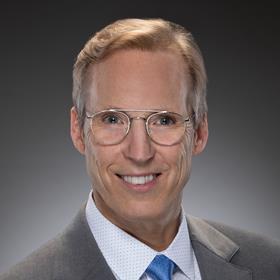
Surprisingly, the greatest challenge facing NCR Atleos in fulfilling this critical role supporting telcos’ enterprise ambition may be simply lack of awareness of the scope (and skill) in what it does. This low profile is by design, and an important facet of quietly supporting major service providers in the B2B space.
“More often than not, we are invisible to the enterprise customers”, says Rich Richardson, Vice‑President for Global Sales, Managed Services, “we are literally going out and acting on behalf of, and representing, partners because we recognise the importance to operators of their brand and their customer experience”.
While the NCR Atleos team is comfortable playing the role of unsung hero, Zipp and Richardson are calling on operators to carefully consider how strategic digitalisation goals can be achieved through more effective partnerships, and embrace of a mindset that prioritises getting things done.
Delivering to enterprises by moving fast while not breaking things
NCR Atleos sees its role as enabling operators to move quickly on delivering new enterprise‑focused solutions while maintaining standards and reliability expected of connectivity services.
Richardson considers this capability and requirement more relevant than ever in a time of great pressure from digital challengers.
“ For new products they’re trying to launch, operators might not have the investment dollars to build out the capability and labs and training that are critical to success. They need to speed up the execution and the product launch. They need to outsource more of those core services to a partner like us. ”
Richardson.
NCR Atleos’ confidence in its ability to support emerging connectivity services in the corporate sector is founded on experience, with Zipp exampling the business’s role in supporting global clients making their mark during the hyper‑growth phase of Software-Defined WAN development. SD‑WAN proved a great success for operators but this was no certainty when services launched, and achieving this required bringing solutions to market in collaboration with a range of partners, involving principles that continue to apply.

“Operators knew the SD-WAN market was going to be big, but not how quickly it was going to develop, or what the return on investment would look like”, observes Richardson. This opened up an opportunity, with NCR Atleos able to extensively support global launches on an accelerated timeframe, encompassing product and network design and orchestration, test and turn up of devices, and ongoing remote monitoring and management services.
Critically, this enabled service providers to quickly secure a foothold in a new market emerging within the enterprise sector.
“Because [as a group] we were focused, innovative and nimble, we were able to turn up that entire product offering very, very quickly for accelerated cycles compared to what could be done [by clients] internally”, Richardson says.
A century old startup with worldwide reach
With roots going back to the 19th century, NCR Atleos’ emergence as a technology services outsourcing provider in the telecom sector extends back to the 1991 acquisition by AT&T of forebearer NCR, which at the time was notable as a computer OEM as well as for ATMs, including field maintenance and support of global networks.
AT&T sought to leverage the latter capability, identifying synergy in installing and maintaining telecom equipment around the world. “After all, ATMs are pretty robust things”, highlights Richardson, so “there was a lot of spare engineering capacity, and the decision was made to sell and re-sell this field force for multi-vendor services”.
After it became independent in 1997, NCR’s field services relationship with AT&T continued, the customer base expanded, and the business extended into a more comprehensive array of support services while also growing globally (boosting its presence to 160 countries). This led to the creation of the Telecom and Technology unit that is a key element of today’s wider NCR Atleos business.
Richardson highlights the benefits of the Telecom and Technology team being part of this larger entity. “I’ve always found it the best of both worlds”, he says: “[within the team] we have that small, innovative, dynamic startup mentality, with the bigger organisation of NCR Atleos behind us, and we’re able to leverage all of those assets”.
“ Our field force gives us a big credibility statement in terms of the quality of services that we have. As you can imagine, in every corner of every country there’s an ATM and, therefore, we need to be able to service that ATM. That’s where our field force is. You find me any other organisation that can deliver on that promise. ”
Richardson.
While maintaining its ubiquitous ground presence, NCR Atleos in recent years has also built up its capabilities in providing remote operations support at strategic locations. This includes development of a major Network Operations Centre employing thousands of staff in Belgrade, Serbia, a locale that is increasingly becoming a key centre for international technology companies tapping a multi‑lingual workforce with strong technical skills. Other centres of excellence can be found in Egypt, Malaysia, and the Americas, supporting the firm’s ‘hub and spoke’ support model.
Metrics that matter: getting it right first time
In an August 2024 study, Analysys Mason found that operators perceive fault response to be the most important factor for enterprises choosing a connectivity provider, with its significance only increasing in recent years.
This tracks solidly onto the importance of operators being able to not only promise service level standards, but also meet these expectations, and Zipp notes that supporting strength in this metric is at the heart of NCR Atleos’ proposition. This empowers operators to offer service level guarantees underpinned by NCR Atleos’ own SLAs, which focus not just on response but also resolution.
“ We’re measured on strict SLAs with our customers in terms of not just how quickly we can arrive on site; it’s also how quickly we can resolve that problem. ”
Zipp.
Zipp particularly highlights the importance of first visit resolution when supporting operators. This requires technicians to not only have the knowledge but also the right tools and replacement equipment to remedy the problem.
NCR Atleos boasts first visit resolution rates of 90% — significantly above the industry average, according to Zipp. He also notes that the field force rarely needs to escalate complex problems to technical assistance groups from equipment manufacturers. “We only have to do that 1% of the time”, he says, “that’s how well trained and experienced our technicians are”.
NCR Atleos also regularly conducts customer surveys to ensure any project is heading in the right direction. “That way, we can anticipate what they’re going to need from us, not just a month down the road, but a year or two years down the road”, explains Zipp.
Leveraging OEM relationships as industry bridges
A little-appreciated aspect of the NCR Atleos business is its tight relationship with OEMs, believes Zipp. He explains that there are two aspects to these partnerships. Firstly, NCR Atleos may be acting as a support arm for an OEM’s end‑clients: deploying, maintaining and managing branded technology, such as routers, SD‑WAN devices or enterprise firewalls.
A second thread is around developing capabilities to support OEMs’ technologies via telco relationships. With this element, NCR Atleos can act as a bridge to the manufacturer, helping the telco develop solutions using OEM technology and ensure readiness for market.
“We not only train our field technicians with whatever certification it requires, we also train our network operations centre personnel so that they can do remote monitoring and management on endpoints”, explains Zipp, “we acquire OEM equipment to go into our training labs, and we also secure global certifications or global designations so that we have the highest level of partner capability with various OEMs”.
Zipp notes that this can entail spending “millions” of dollars on specialised tooling to ensure field technicians are able to undertake work and can “support the OEM decisions an operator has made”.
At the same time, demand is growing for multi‑vendor solutions, whether through telcos wanting to operate more open infrastructure, or enterprise end‑users expecting more choice.
Again, this plays into NCR Atleos’ strong relationships across the vendor ecosystem, with Richardson noting a past comparable change in mindset with the introduction of SD-WAN. “Not only were enterprises embracing more dynamic architectures”, he observes, “they also started stipulating the technology”. An ongoing consequence, Richardson adds, is that operators need to be permanently ready to meet enterprise technology demands “at speed and at scale”.
Helping AI market leaders keep their cool
Across the communications sector, AI is a major topic of conversation and consideration, and close relationships with leading players in the sector are giving NCR Atleos a ringside view of developments.
“It feels like the most disruptive thing we’ve seen in 30 years”, Richardson says, comparing its rapid adoption to transformation that accompanied the rise of the internet.
From NCR Atleos’ own perspective, AI is having two immediate impacts. Internally, the business is embedding AI and machine learning as part of ongoing automation of business operations, with AIOps enabling quicker deployment of services that are both faster and better for users.
For its client base, Richardson considers NCR Atleos well placed to deliver support for the burgeoning and intensive infrastructure that AI requires. “GPU‑driven infrastructure is the main engine behind AI, and we do a lot of services to support infrastructure to support AI”, he says.
Richardson particularly notes that the level of processing involved comes with challenges on cooling, and sees the importance of NCR Atleos’ ability to deliver managed coolant service programmes growing in lockstep with AI itself.
Staying ahead of the game with innovation awareness
NCR Atleos’ pragmatism is evident in its research and development approach. It does not have what might be considered a traditional R&D department, instead always forward planning to consider how the market will evolve, and to be ready when it shifts.
This might, for example, entail prepping security operations centre offerings across geographically-dispersed facilities for end‑to‑end Secure Access Service Edge delivery as SASE market space matures, or the virtualisation of the local area network and its management with a view to productisation with CSP partners.
Looking further, developments around 5G private network and satellite connectivity are on the radar, with NCR Atleos’ presence in countries such as Brazil and India an important contributor to development of satellite services that can be scaled for global delivery.
Richardson cites private networks as another area where focus has built over time. “We’ve had it on our roadmap for a couple of years”, he says, “and the benefit we have is we can leverage these investments across the whole market, and get real economies of scale when those markets do reach maturity”.
The evolution of security for software‑defined access networks is a further key focus, with SASE technologies increasingly capable of providing functionality that can accommodate zero‑trust access, secure web gateways, firewall‑as‑a‑service and other emerging features.
“ SASE is becoming more mature, but managed SASE from a single vendor is really still in the early growth phase, and we’re developing extensive capabilities for SASE across multiple OEMs so that we can support the requirements of our telco customer base whenever they need us to. ”
Zipp.
NCR Atleos also sees opportunity around security based on its expertise and experience with security vendors, with Zipp noting that “cybersecurity vendors have a lot of momentum right now, and often for operators the fastest way to integrate security technology with network operations is to work with us to turn up a service without the need to train and upskill internally before its value is proven”.
Playing the long game to sweat assets, smoothing path to the future
NCR Atleos recognises that taking more aspects of product management in‑house can be seen as a natural progression for many operators once business cases are clearer, revenues are flowing, and costs are understood.
However, Richardson believes ongoing outsourcing can also open up opportunities for operators to more effectively target their resources towards higher‑margin services while remaining cost‑competitive on key services.
Zipp, meanwhile, considers that NCR Atleos’ prowess in areas such as professional and remote services may be underestimated here. “Our professional services teams are as proficient as our field force in areas such as enterprise network design and planning”, he says, “and although we do that for a lot of clients, I don’t think it’s as well‑recognised”.
Benefits to operators are powerful, Zipp believes, giving the opportunity to work programmatically by developing services that can be set up and managed by NCR Atleos, and sold on a recurring basis through operator sales channels. “That takes the burden off them and puts it on us to develop solutions that their sales force can sell in large quantities”, says Zipp.
NCR Atleos is also growing a business in managing products once they go beyond their peak, to play a role at the other end of lifecycle management by taking on equipment maintenance.
Zipp describes these combined capabilities as “creating the infinity loop”, building on investment in service, monitoring and management capabilities through network operations centres around the world.
“ Our proposition is ‘we can deliver the end‑to‑end services, from the complex remote managed services, service desk, security operations centre through to the professional services around engagement consultancy design and down to the field services’. When it comes time to upgrade, we can manage the end-game, and then do it all again. ”
Richardson.
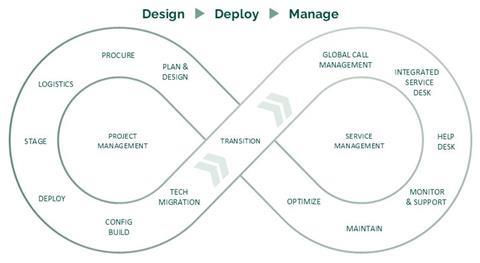
Topics
- 5G
- AI/GenAI/ML (artificial intelligence, agentic, machine learning)
- Barry Zipp
- Broadcom (VMware)
- Cisco
- Cloud
- Cybersecurity
- Digitalisation
- Enterprise (B2B)
- Fibre (FTTC/FTTP)
- Fortinet
- Industry Voice
- Innovation (R&D)
- Juniper Networks
- NCR Atleos
- Network & Infrastructure
- Partnerships & Alliances
- Rich Richardson
- Security
- Suppliers & SCM
- System integration
- Virtualisation (SDN, SD-WAN, NFV, VNF, VRAN)



